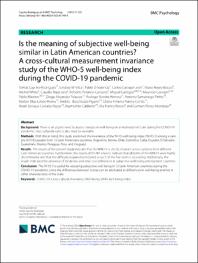Mostrar el registro sencillo del ítem
Is the meaning of subjective well-being similar in Latin American countries? A cross-cultural measurement invariance study of the WHO-5 well-being index during the COVID-19 pandemic
| dc.contributor.author | Caycho-Rodríguez, Tomás | |
| dc.contributor.author | Vilca, Lindsey W | |
| dc.contributor.author | Valencia , Pablo D | |
| dc.contributor.author | Carbajal-León, Carlos | |
| dc.contributor.author | Reyes-Bossio, Mario | |
| dc.contributor.author | White, Michel | |
| dc.contributor.author | Rojas-Jara, Claudio | |
| dc.contributor.author | Polanco-Carrasco, Roberto | |
| dc.contributor.author | Gallegos, Miguel | |
| dc.contributor.author | Cervigni , Mauricio | |
| dc.contributor.author | Martino, Pablo | |
| dc.contributor.author | Palacios, Diego Alejandro | |
| dc.contributor.author | Moreta-Herrera , Rodrigo | |
| dc.contributor.author | Samaniego-Pinho, Antonio | |
| dc.contributor.author | Lobos-Rivera, Marlon Elías | |
| dc.contributor.author | Buschiazzo Figares, Andrés | |
| dc.contributor.author | Puerta-Cortés, Diana Ximena | |
| dc.contributor.author | Corrales-Reyes, Ibraín Enrique | |
| dc.contributor.author | Calderón, Raymundo | |
| dc.contributor.author | Franco Ferrari, Ilka | |
| dc.contributor.author | Flores-Mendoza, Carmen | |
| dc.date.accessioned | 2023-08-03T21:13:11Z | |
| dc.date.available | 2023-08-03T21:13:11Z | |
| dc.date.issued | 2023-04-06 | |
| dc.identifier.uri | https://hdl.handle.net/20.500.13053/9121 | |
| dc.description.abstract | “Background: There is an urgent need to assess changes in well-being on a multinational scale during the COVID-19 pandemic, thus culturally valid scales must be available. Methods: With this in mind, this study examined the invariance of the WHO well-being index (WHO-5) among a sample of 5183 people from 12 Latin Americans countries (Argentina, Bolivia, Chile, Colombia, Cuba, Ecuador, El Salvador, Guatemala, Mexico, Paraguay, Peru, and Uruguay). Results: The results of the present study indicate that the WHO-5 is strictly invariant across samples from different Latin American countries. Furthermore, the results of the IRT analysis indicate that all items of the WHO-5 were highly discriminative and that the difficulty required to respond to each of the five items is ascending. Additionally, the results indicated the presence of moderate and small size differences in subjective well-being among most countries. Conclusion: The WHO-5 is useful for assessing subjective well-being in 12 Latin American countries during the COVID-19 pandemic, since the differences between scores can be attributed to differences in well-being and not in other characteristics of the scale.“ | es_PE |
| dc.format | application/pdf | es_PE |
| dc.language.iso | eng | es_PE |
| dc.publisher | BioMed Central Ltd | es_PE |
| dc.rights | info:eu-repo/semantics/openAccess | es_PE |
| dc.rights.uri | https://creativecommons.org/licenses/by/4.0/ | es_PE |
| dc.subject | COVID-19; Cross-cultural; Invariance; WHO well-being index; Well-being. | es_PE |
| dc.title | Is the meaning of subjective well-being similar in Latin American countries? A cross-cultural measurement invariance study of the WHO-5 well-being index during the COVID-19 pandemic | es_PE |
| dc.type | info:eu-repo/semantics/article | es_PE |
| dc.identifier.doi | 10.1186/s40359-023-01149-8 | |
| dc.type.version | info:eu-repo/semantics/publishedVersion | es_PE |
| dc.publisher.country | UK | es_PE |
| dc.subject.ocde | 3.03.00 -- Ciencias de la salud | es_PE |
Ficheros en el ítem
Este ítem aparece en la(s) siguiente(s) colección(es)
-
SCOPUS [380]


